
The president of the Philippines is the head of state and the head of government of the Philippines. The president leads the executive branch of the Philippine government and is the commander-in-chief of the Armed Forces of the Philippines. The president is directly elected by the people, and is one of only two nationally elected executive officials, the other being the vice president of the Philippines. However, four vice presidents have assumed the presidency without having been elected to the office, by virtue of a president's intra-term death or resignation.

Maria Corazon "Cory" Sumulong Cojuangco Aquino was a Filipina politician who served as the 11th president of the Philippines from 1986 to 1992. She was the most prominent figure of the 1986 People Power Revolution, which ended the two-decade rule of President Ferdinand Marcos and led to the establishment of the current democratic Fifth Philippine Republic.

Benigno Simeon Cojuangco Aquino III, also known as Noynoy Aquino and colloquially as PNoy, was a Filipino politician who served as the 15th president of the Philippines from 2010 to 2016. Before being elected president, Aquino was a member of the House of Representatives and Senate from 1998 to 2010, and also served as a deputy speaker of the House of Representatives from 2004 to 2006.

The Philippine Independent Church is an independent Christian denomination in the form of a national church in the Philippines. Its schism from the Catholic Church was proclaimed in 1902 by the members of the Unión Obrera Democrática Filipina, due to the mistreatment of the Filipinos by Spanish priests and the execution of José Rizal during Spanish colonial rule.

Iglesia ni Cristo is an independent Nontrinitarian Christian church, founded and registered by Felix Y. Manalo in 1914 as a unipersonal religious corporation to the United States administration of the Philippines.
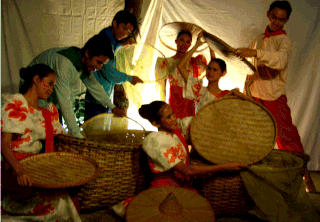
Religion in the Philippines is marked by a majority of people being adherents of the Christian faith. At least 88% of the population is Christian; about 79% belong to the Catholic Church while about 9% belong to Protestantism, Orthodoxy, Restorationist and Independent Catholicism and other denominations such as Iglesia Filipina Independiente, Iglesia ni Cristo, Seventh-day Adventist Church, United Church of Christ in the Philippines, Members Church of God International (MCGI) and Evangelicals. Officially, the Philippines is a secular nation, with the Constitution guaranteeing separation of church and state, and requiring the government to respect all religious beliefs equally.
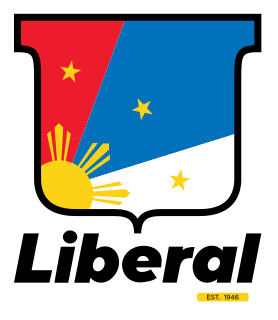
The Liberal Party, abbreviated as the LP, is a liberal-democratic political party in the Philippines.
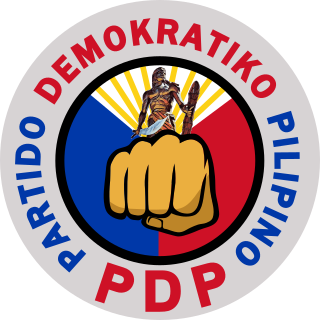
The Partido Demokratiko Pilipino–Lakas ng Bayan, abbreviated as PDP–Laban, is a left-wing socialist political party in the Philippines founded in 1982 and it has been the ruling party since 2016 under the administration of President Rodrigo Duterte.
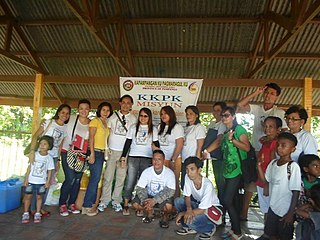
The Kapampangan people, Pampangueños or Pampangos, are the sixth largest ethnolinguistic group in the Philippines, numbering about 2,784,526 in 2010. They live mainly in the provinces of Pampanga, Bataan and Tarlac, as well as Bulacan, Nueva Ecija and Zambales.

Gregorio Ballesteros Honasan II, better known as Gringo Honasan, is a Filipino politician and a cashiered Philippine Army officer who led unsuccessful coups d'état against President Corazon Aquino. He played a key role in the 1986 EDSA Revolution that toppled President Ferdinand Marcos.
First Lady or First Gentleman of the Philippines is the courtesy title given to the host or hostess of Malacañang Palace, the residence of the head of state and head of government of the Philippines.

This article covers the history of the Philippines following the 1986 People Power Revolution, known as the Fifth Philippine Republic.
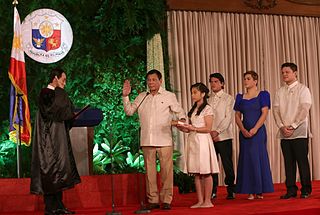
The inauguration of the president of the Philippines is a ceremonial event marking the commencement of a new six-year term of a Philippine president. The presidential inauguration occurs on June 30, as mandated by the 1987 Philippine Constitution. Under the previous 1935 Constitution, the date was December 30, which is also Rizal Day; the last inauguration to take place on the older date was Ferdinand Marcos' second one on December 30, 1969. The most recent public presidential inauguration ceremony, the swearing in of President Rodrigo Duterte to begin his six-year term in office, took place on Thursday, June 30, 2016.

The United Church of Christ in the Philippines is a Christian denomination in the Philippines. Established in its present form in Malate, Manila, it resulted from the merger of the Evangelical Church of the Philippines, the Philippine Methodist Church, the Disciples of Christ, the United Evangelical Church and several independent congregations.

Corazon Cojuangco-Aquino, the eleventh President of the Philippines, died on August 1, 2009, at the Makati Medical Center in Makati of cardiorespiratory arrest after being in hospital since June 2009, and was first diagnosed with colorectal cancer in 2008.

BRP Ang Pangulo (AT-25) is a presidential yacht that was acquired by the Philippine government in 1959. The yacht was first used by President Carlos P. Garcia.

The secretary of justice is the head of the Department of Justice and is a member of the president's Cabinet.

Of the sixteen presidents of the Philippines, a number have shown proficiency in languages other than English and Tagalog.

















